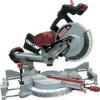Craftsman 21221 Operation Manual - Page 147
I, ,d,I U,d
 |
View all Craftsman 21221 manuals
Add to My Manuals
Save this manual to your list of manuals |
Page 147 highlights
REMOVING OR INSTALLING THE RIGHT SLIDING FENCE Removing (Fig. FF) 1. Unlock the fence cam-locking lever by pushing it out toward the rear of the machine. 2. Lift up on the sliding fence to remove it from the saw. Installing 1. Place the sliding fence onto the miter saw fence aligning the nut (1) with the slot (4). 2. To lock the sliding fence, push the cam-locking lever in toward the front of the machine. Fig. FF 1 JJ .........÷. I, ,d,I U,d, 4 SLIDING CARRIAGE SYSTEM (FIG. GG) Ak, WARNING I To reduce the risk of injury, return carriage to the full rear position after each crosscut operation. 1. For a chop cutting operations on small workpieces, slide the cutting head assembly completely toward the rear of the unit and tighten the carriage lock knob (1). 2. To cut wide boards up to 12-1/4 in., the carriage lock knob should be loosened to allow the cutting head to slide freely. Fig. GG WARNINI G To avoid injury from materials being thrown, always unplug the saw to avoid accidental starting, and remove small pieces of material from the table cavity. The table insert may be removed for this purpose, but always reattach the table insert prior to performing a cutting operation. MITER CUT (FIG. HH) The sliding compound miter saw is equipped with ten positive miter stops (1) on the saw base. The locations are at O, 15, 22.5, 31.6 and 45 degrees left and right, and 60 ° right. These locations represent the most common angles for cutting operation. To make a miter cut: 1. Unlock the miter table by lifting up on the miter quick-cam table lock (2). 2. While raising the positive stop locking lever (3) up, grasp the miter handle (4) and rotate the miter table left or right to the desired angle. 3. Release the positive stop locking lever and set the miter at the desired angle making sure the lever snaps into place. NOTE: The lever will only lock into place at one of the ten positive stops. 35















